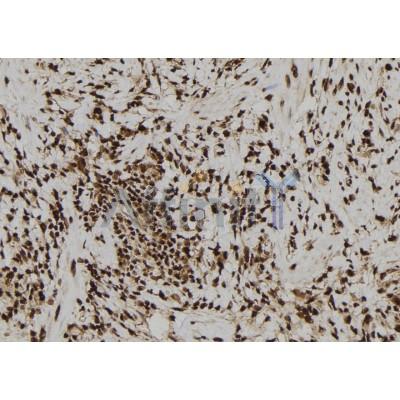Zyxin Antibody - #DF6858
製品説明
*The optimal dilutions should be determined by the end user. For optimal experimental results, antibody reuse is not recommended.
*Tips:
WB: For western blot detection of denatured protein samples. IHC: For immunohistochemical detection of paraffin sections (IHC-p) or frozen sections (IHC-f) of tissue samples. IF/ICC: For immunofluorescence detection of cell samples. ELISA(peptide): For ELISA detection of antigenic peptide.
引用形式: Affinity Biosciences Cat# DF6858, RRID:AB_2838817.
折りたたみ/展開
ESP 2; ESP2; HED 2; HED2; ZYX; ZYX protein; Zyxin 2; Zyxin2;
免疫原
A synthesized peptide derived from human Zyxin, corresponding to a region within the internal amino acids.
- Q15942 ZYX_HUMAN:
- Protein BLAST With
- NCBI/
- ExPASy/
- Uniprot
MAAPRPSPAISVSVSAPAFYAPQKKFGPVVAPKPKVNPFRPGDSEPPPAPGAQRAQMGRVGEIPPPPPEDFPLPPPPLAGDGDDAEGALGGAFPPPPPPIEESFPPAPLEEEIFPSPPPPPEEEGGPEAPIPPPPQPREKVSSIDLEIDSLSSLLDDMTKNDPFKARVSSGYVPPPVATPFSSKSSTKPAAGGTAPLPPWKSPSSSQPLPQVPAPAQSQTQFHVQPQPQPKPQVQLHVQSQTQPVSLANTQPRGPPASSPAPAPKFSPVTPKFTPVASKFSPGAPGGSGSQPNQKLGHPEALSAGTGSPQPPSFTYAQQREKPRVQEKQHPVPPPAQNQNQVRSPGAPGPLTLKEVEELEQLTQQLMQDMEHPQRQNVAVNELCGRCHQPLARAQPAVRALGQLFHIACFTCHQCAQQLQGQQFYSLEGAPYCEGCYTDTLEKCNTCGEPITDRMLRATGKAYHPHCFTCVVCARPLEGTSFIVDQANRPHCVPDYHKQYAPRCSVCSEPIMPEPGRDETVRVVALDKNFHMKCYKCEDCGKPLSIEADDNGCFPLDGHVLCRKCHTARAQT
種類予測
Score>80(red) has high confidence and is suggested to be used for WB detection. *The prediction model is mainly based on the alignment of immunogen sequences, the results are for reference only, not as the basis of quality assurance.
High(score>80) Medium(80>score>50) Low(score<50) No confidence
研究背景
Adhesion plaque protein. Binds alpha-actinin and the CRP protein. Important for targeting TES and ENA/VASP family members to focal adhesions and for the formation of actin-rich structures. May be a component of a signal transduction pathway that mediates adhesion-stimulated changes in gene expression (By similarity).
Cytoplasm. Cytoplasm>Cytoskeleton. Nucleus. Cell junction>Focal adhesion.
Note: Associates with the actin cytoskeleton near the adhesion plaques. Enters the nucleus in the presence of HESX1.
Belongs to the zyxin/ajuba family.
研究領域
· Cellular Processes > Cellular community - eukaryotes > Focal adhesion. (View pathway)
Restrictive clause
Affinity Biosciences tests all products strictly. Citations are provided as a resource for additional applications that have not been validated by Affinity Biosciences. Please choose the appropriate format for each application and consult Materials and Methods sections for additional details about the use of any product in these publications.
For Research Use Only.
Not for use in diagnostic or therapeutic procedures. Not for resale. Not for distribution without written consent. Affinity Biosciences will not be held responsible for patent infringement or other violations that may occur with the use of our products. Affinity Biosciences, Affinity Biosciences Logo and all other trademarks are the property of Affinity Biosciences LTD.




